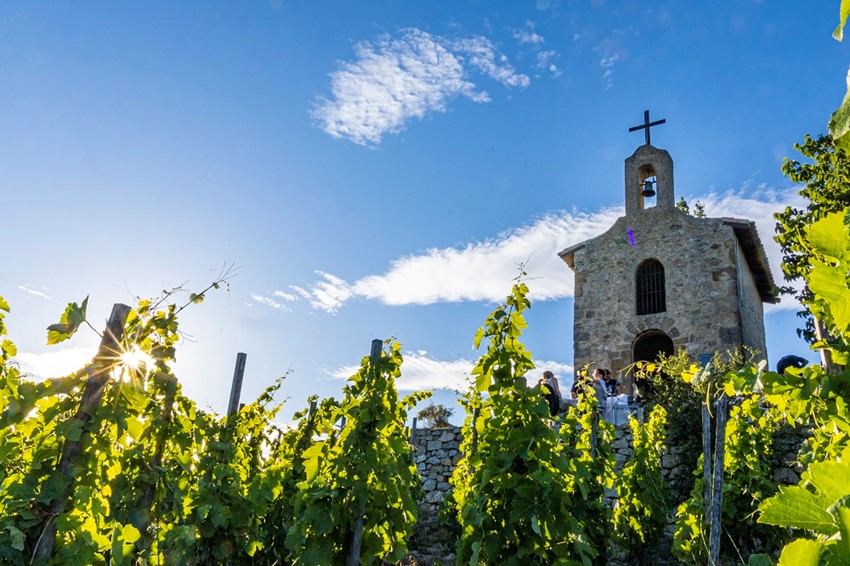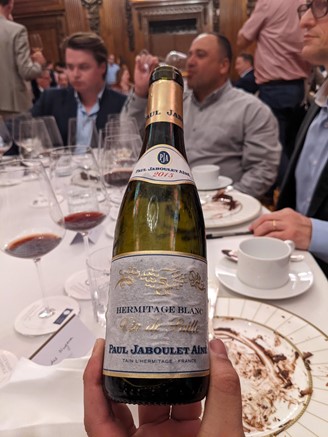“It is impossible to talk about Hermitage and not think of Jaboulet. That says a lot about them,” remarks Georgios Iordanidis, Head of Wine at Annabel’s in Berkeley Square, London. Undoubtedly one of the foremost producers of fine wines in the northern Rhône Valley, Domaines Paul Jaboulet Aîné is also a clear leader when it comes to sustainability.
“One of the first things they teach you about Rhône wines is the great value for money you get when you buy a bottle. The fine wine market is led by other regions, both from France and outside of it, but I can easily see the fine wine Rhône market improving in the next few years,” continues Georgios. “The focus will inevitably shift to different regions and the Rhône can take advantage of that.”
“Jaboulet plays a major role in the region, especially when talking about fine wine. It amazes me how their wines have this depth of flavour and still manages to be fresh on the palate, both in young and aged examples. Jaboulet is the institution and pride of the region. From La Chapelle to Le Meal, the choices are premium, and you can’t go wrong with them.”

The famous chapel from which La Chapelle takes its name
Michele Fazari, Head Sommelier at the Four Seasons Hotel London at Ten Trinity Square, agrees. “I love the fine wines from the Rhône for their value and quality; the different terroir provides a great expression of both the single variety and the blends that make the fine wine from Rhône so unique. La Chapelle has always been one the best fine wines from the region. Jaboulet has been successful for its great expression of Syrah and has been focusing on making the best fine wines from Rhône terroir.”
A spectacular showcase
Earlier in the year, a few Bibendumites attended a legendary (H)ermitage dinner, hosted at The Four Seasons Hotel London at Ten Trinity Square. Rose Saunders, business development manager for fine wine at Bibendum, recalls: “The event started with a superb tasting of (H)ermitage vintages from a raft of truly exceptional producers, including the likes of Paul Jaboulet Aîné, Domaine Jean-Louis Chave and M.Chapoutier, to name a few.”
 “Following the tasting, we were treated to a three-course tasting menu by the famed Anne-Sophie Pic, paired with old (H)ermitage vinages. Our table was hosted by Domaines Paul Jaboulet Aîné who pulled out all the stops, presenting us with a flight of truly special wines, almost all from magnum.”
“Following the tasting, we were treated to a three-course tasting menu by the famed Anne-Sophie Pic, paired with old (H)ermitage vinages. Our table was hosted by Domaines Paul Jaboulet Aîné who pulled out all the stops, presenting us with a flight of truly special wines, almost all from magnum.”
“We kicked off the meal with a 2010 La Chapelle white paired with a crab starter. The wine was beautifully full-bodied and pure, with pronounced aromas of ripe apricot and some gentle floral notes. We then moved onto a very exciting duo of 1982 and 1969 La Chapelle reds with a Hereford beef fillet. Both were holding up well, still showing plenty of blackcurrant and other dark fruits, with definite coffee characteristics coming through. The night ended with their 2015 Vin de Paille which was an absolute treat to enjoy alongside the dark chocolate dessert,” Rose concludes.
Sustainable to the core
As the winners of the Amorim Biodiversity Award at the 2021 The Drinks Business Green Awards, there’s no denying that Jaboulet is serious about sustainability. But it’s about more than organics, or even biodynamics; it’s about more than saving water or gaining certifications. For the team at Jaboulet, it’s about a holistic approach that reinforces the biodiversity of their very special piece of earth.

From planting hundreds of trees and creating two natural reserves in the woods and forests around the vineyards, to cultivating 1,500 square meters of organic fruit and vegetable gardens, it is no wonder they are considered the leaders in this field.
“Sustainability cannot be optional anymore,” declares Georgios. “Climate change is not just something we fear; it is everywhere we look. Therefore, we must all play our part in it. One of the good things I can already see is the awareness many people have. Many guests ask me questions about the wine and what the particular producer is doing for the environment. Discussions are multiple and varied. The focus point though must be that we all have to do something – from lighter glass bottles to kinder frost prevention, it all counts. Some regions seem to be more advanced in this regard, and I am confident more will follow.”




